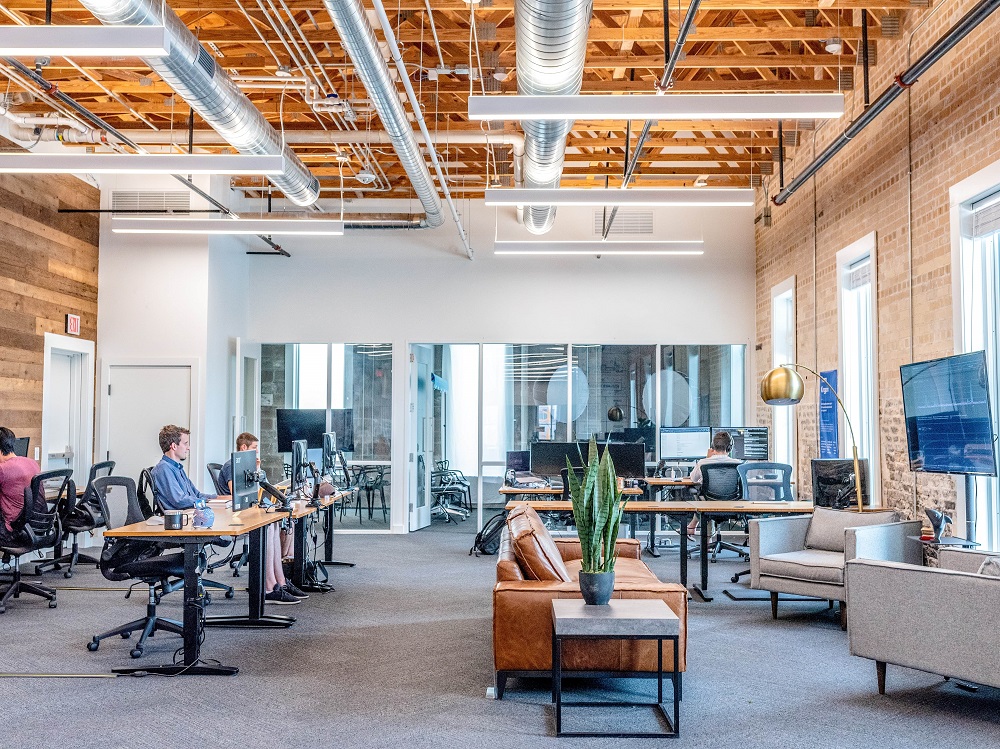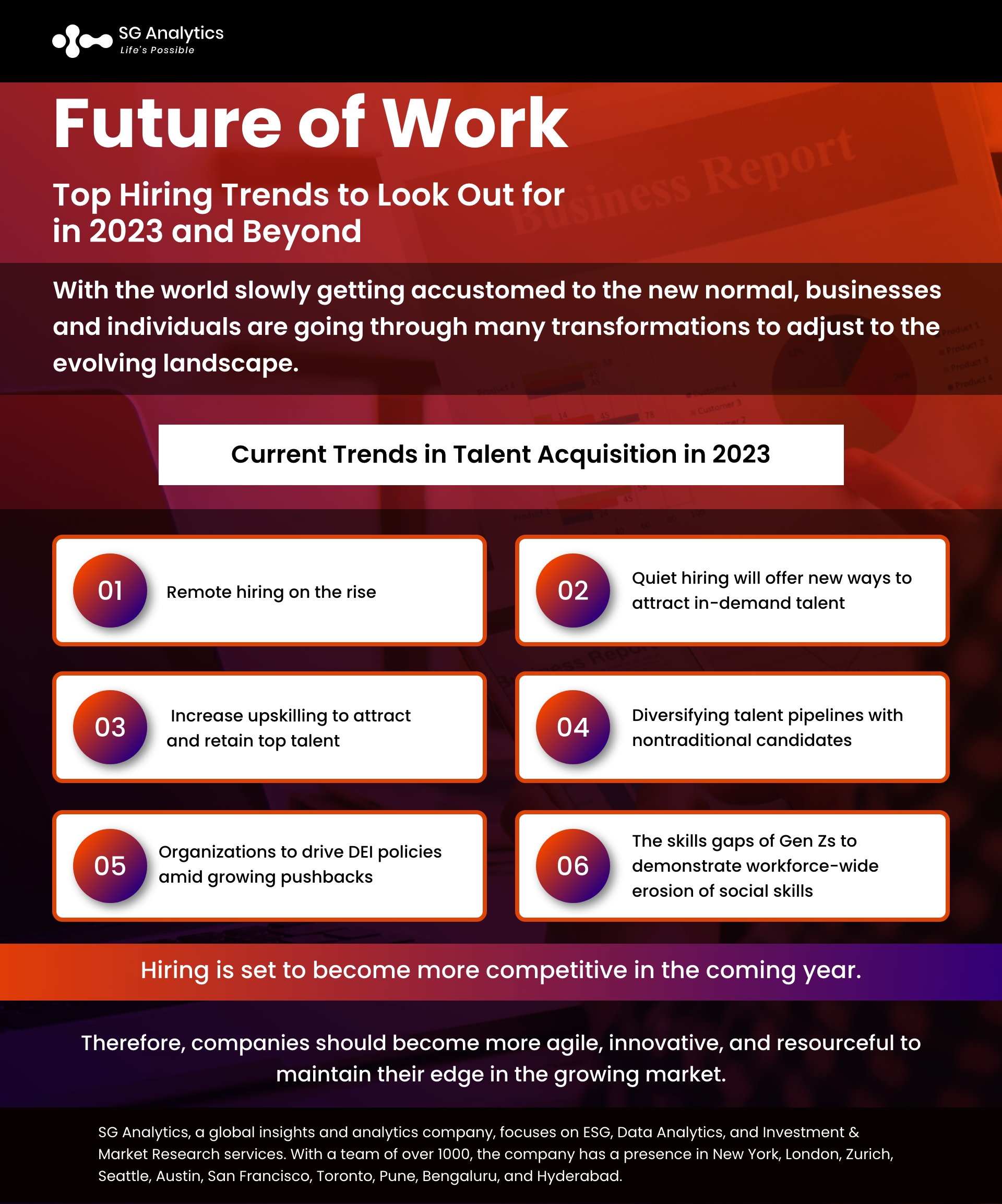Since the onset of the pandemic, the world has witnessed a cascade of global events in the last few years, such as volatile geopolitical situations, the looming recession threat, along with environmental deterioration that is leading to climate change and global warming. And with the world slowly getting accustomed to the new normal, businesses and individuals are undergoing many transformations to adjust to the changing landscape.
Today the future of work lies on a different trajectory than it used to be. And recruitment is one of the primary functions that is struggling to match this trajectory for businesses to thrive. With 2024 on the horizon, organizations are gearing up to embrace new trends in the new year. Here are some hiring trends industry leaders can expect to build their recruitment strategies.
Read more: Why Investing in Employees Enables Better Business Results?
Current Trends in Talent Acquisition in 2024
Trends #1: Remote Hiring on the Rise
Employees look at an organization's work culture, policies, and flexibility rather than considering remuneration as the determining factor. A recent study showed that 67% of southeast Asian employees would be happy than be unhappy but take home a big paycheck. And the availability of remote work plays a prominent role in employee satisfaction as well as retention. The past two years have been a testament to the fact that employee productivity is possible from anywhere. It has also highlighted that conventional HR practices can be made more efficient by incorporating a tech-first approach. And organizations are now trying to offer flexibility to attract top talent.
In 2024 and beyond, there will be an upswing in remote recruitment that will be backed by cutting-edge, SaaS-based tech frameworks designed specifically for remote hiring. It will equip the organizations to deliver a definitive employee experience right from the pre-hiring phase.
Trends #2: Increase Upskilling to Attract and Retention Top Talent
Globally, organizations are facing an acute shortage of skilled talent that is intensifying the wars between companies. Every enterprise wants to hire the best talent in the industry. It is estimated that by the year 2030, almost 85 million jobs will remain vacant due to a shortage of skilled labor. And to overcome this bottleneck, a number of organizations are striving to introduce upskilling programs.
In 2024, more companies will offer skilling/reskilling programs even before the employee is onboarded. They will leverage artificial intelligence (AI) in their learning management systems to support personalized upskilling.

Read more: How can Leaders Establish a Culture of Curiosity and Innovation in their Organization?
Trends #3: Organizations to Drive DEI Policies Amid Growing Pushback
With the rising significance of diversity and inclusion within organizations, industry leaders are bolstering diversity, equity, and inclusion (DEI) efforts as employees are also showing signs of resistance. 42% of employees believe that an organization’s DEI efforts should be divisive, as many employees feel alienated or even resent their DEI efforts.
Political and ideological trends often characterize DEI as social engineering against historically favored groups, thus amplifying resistance within the organization. Some employees often push back, invalidate, disrupt, or disconnect from the program framework established to enable marginalized groups. Many organizations ignore these employee pushbacks as they fear validating it as legitimate, and it may decrease engagement and inclusion, thus resulting in attrition. However, in 2024, savvy leaders will address the opposition before they transform into more disruptive forms of resistance.

Trends #4: Quiet hiring will offer New Ways to Attract in-demand Talent
Everyone is well aware of the viral “quiet quitting” wave that made headlines in the second half of 2022. Quiet quitting brought to light the picture of employees refusing to go above and beyond in their job and doing the minimum required. At the same time, this led to organizations keeping people but losing skills and capabilities. HR leaders are turning to this practice to attract new skills and capabilities without adding new full-time employees.
With the competitive talent landscape on the rise, in 2024, organizations will have to introduce new policies to prioritize their employees. In today's environment, it is imperative to tackle ongoing concerns in order to set and achieve strategic workforce and talent goals. The focus is on internal talent and mobility in order to ensure that employees can address the priorities that matter the most. Organizations are also introducing upskilling opportunities for existing talent to meet evolving organizational needs.
Many organizations have started adopting tech platforms to increase their employee engagement. By introducing enterprise social media rewards and recognition platforms with virtual points, they were offering new components that would benefit the employees. This implementation will help enhance employee engagement, enabling companies to showcase the benefits and attract new talent. Integrating alternate approaches like leveraging alumni networks will help provide flexibility to bring in talent only as needed.

Trends #5: Diversifying Talent Pipelines with Nontraditional Candidates
For years, organizations have highlighted the need for strategic value to expand and diversify their talent pipelines. And in 2024, they will be putting these words into action. With employees charting nonlinear career paths, organizations are now witnessing a rise in candidates applying for jobs outside their current areas of expertise. And this trend is set to climb further in the coming years. With the aid of hiring tracking, managers show fewer concerns about candidates' industry experience and technical skills, resulting in highly skilled and diverse candidate pools. In 2024, organizations will become more comfortable assessing candidates based on their ability to perform in the role, not their credentials or prior industry experience.
Read more: Ways Marketing and Advertising will Change for the Better
Trends #6: The Skills Gap of Gen Zs to Demonstrate Workforce-wide Erosion of Social Skills
Social isolation due to the pandemic has hit young people hard. A recent survey demonstrated that almost 46% of Gen Z employees believe that the pandemic has made pursuing their educational or career goals more difficult. Around 51% voiced their concerns indicating that their academia has not prepared them to enter the real workforce. Due to this, the Gen Z population has even missed developing soft skills like networking, communicating confidently, and developing social stamina along with attentiveness required to work long hours in an organization.

This lack of experience is now negatively impacting organizations, as many aim to hire cheap talent in a tight labor market. However, it is not just limited to Gen Z. Everyone’s social skills have eroded due to the pandemic. With burnout, exhaustion, and career insecurity on the rise, employees are feeling heightened pressure which is negatively impacting their work performance. In 2024, organizations will need to address these issues and integrate new policies to redefine professionalism for their entire workforce.
Key Takeaways
-
Organizations globally are facing historic challenges due to the rising competition in the talent landscape, which is leading to an exhausted workforce along with pressure to control costs.
-
In 2024, executives will integrate new frameworks to snag in-demand talent and focus more on employee mental health, as well as confront data ethics in new HR technology.
-
The emerging high-impact trends will help in creating an exciting opportunity for organizations to distinguish themselves as employers of choice.
Read more: Anatomy of Consumer Data: How is it driving Changes in Decisions for Businesses?

Final Thoughts
In today's super-dynamic talent landscape, it is the candidates who oversee the jobs and not the other way around. This gives them the power to turn down a job role or experience that does not align with their shifting expectations. A recent PwC survey highlighted that nearly half of the job seekers are willing to turn down an employer or an organization if they received a poor candidate experience.
And hiring is set to become more competitive in the coming year. Companies need to become more agile, innovative, and resourceful to maintain their edge in the growing market. With the latest technology emerging as the winning factor in this competition, hiring the right candidate is vital for the beginning of the story. Organizations will be required to put in a lot of effort to engage as well as retain talent. It is due to this reason that transparency, communication, and growth have become the core areas for new hires who expect to be included and informed in every organizational situation.
With a presence in New York, San Francisco, Austin, Seattle, Toronto, London, Zurich, Pune, Bengaluru, and Hyderabad, SG Analytics, a pioneer in Research and Analytics, offers tailor-made services to enterprises worldwide.
A leader in Market Research services, SG Analytics, enables organizations to achieve actionable insights into products, technology, customers, competition, and the marketplace to make insight-driven decisions. Contact us today if you are an enterprise looking to make critical data-driven decisions to prompt accelerated growth and breakthrough performance.










